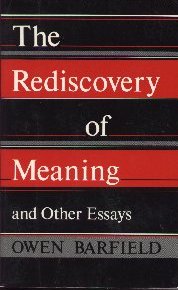
| The Literal |
"We call a sentence 'literal,'" he writes in "The Meaning of Literal," "when it means what it affirms on the face of it, and nothing else. If some sentences are not literal, that is because it is possible, by recognized linguistic usage, to affirm or express one thing and to mean another thing, either instead of or as well as the first" (RM 32). But the question remains:
In fact, "the presumed history of . . . literal words of immaterial import has gone through four stages, in the first and last of which their meanings were exclusively literal, while in the two intermediate stages they functioned as vehicles having a tenor."To what, precisely does, each one of them refer--the tens of thousands of abstract nouns which daily fill the columns of our newspapers, the debating chambers of our legislatures, the consulting rooms of our psychiatrists? Progress, tendency, culture, democracy, liberality, inhibition, motivation, responsibility--there was a time when each one of them, either itself or its progenitor in another tongue, was a vehicle referring to the concrete world of sensuous experience with a tenor of some sort peeing, or breathing, or bursting through. But now they are just "literal" words--the sort of words we have to use, when we are admonished not to speak in metaphors. (RM 38)
"Literalness," we must conclude, is thus "a quality which some words have achieved in the course of their history; it is not a quality with which the first words were born . . ." (RM 41).1 Indeed, it would be too much to say that "There is . . . no such thing as literalness. The most we can safely say, therefore, is that the literal and discursive use of language is the way in which it is used by a speaker, who is either unaware of, or is deliberately ignoring, that real and figurative relation between man and his environment, out of which the words he is using were born and without which they could never have been born" (RM 43).We may call the first stage--at which they are presumed to have referred solely to material objects--the "born" literal, and the last stage--at which they are presumed to refer to immaterial entities, real or fictitious--the "achieved" literal. Now I believe it will be found that our whole way of thinking about the achieved literal is based on a tacitly assumed analogy with the born literal. We assume that it is not the natural, simple nature of a noun to be a vehicle with a tenor, because nouns did not begin that way. They began life as plain labels for plain objects and that is their true nature. It was only later, as a result of the operation of human fancy in metaphor-making, that they came to be used for a time as vehicles with a tenor; and when that stage is over and they have once more achieved literalness, we feel that they have reverted to their pristine innocence and become once more labels for objects, even if we are firmly convinced that the new objects do no exist. Better a fictitious entity than none at all--for a noun to be the name of! (RM 38-39)
Under the reign of modern idolatry all this becomes obscured, but our confusion about literal and figurative is by no means universal.
Needless to say, Barfield is very impatient with the simplistic thinking of modern literalists.When the "things" of the physical world have become idols, then indeed the literal interpretation excludes the symbolical and vice versa. But where everything is a representation at least half-consciously experienced as such, there is as yet no contradiction. For a representation experienced as such is neither literal nor symbolical; or, alternatively, it is both at the same time. Nothing is easier for us, than to grasp a purely literal meaning; and if we are capable at all of grasping, in addition, a symbolical or "fancy" meaning, as we do in poetry, we are in no danger of confusing the one with the other. Before the scientific revolution, on the other hand, it was the concept of the "merely literal" that was difficult. (SA 75)
Listen attentively to the response of a dull or literal mind to what insistently presents itself as allegory or symbol, and you may detect a certain irritation, a faint, incipient aggressiveness in its refusal. Here I think is a deep-down moral gesture. You may, for instance, hear the literal man object suspiciously that he is being "got at." And this is quite correct. He is. Just as he is by being "got at" by his unconscious through the symbolism of his dreams. An attempt is being made, of which he is dimly aware, to undermine his idols, and his feet are being invited on to the beginning of the long road, which in the end must lead him to self-knowledge, with all the unacceptable humiliation which that involves. Instinctively he does not like it. He prefers to remain "literal." But of course he hardly knows that he prefers it, since self-knowledge is the very thing which he is avoiding. (SA 163)
| See in particular "The Meaning of Literal" (RM 32-43), "Modern Idolatry: The Sin of Literalness" (HGH 36-64), Saving the Appearances, passim. |
1As Barfield
goes on to explain,
|